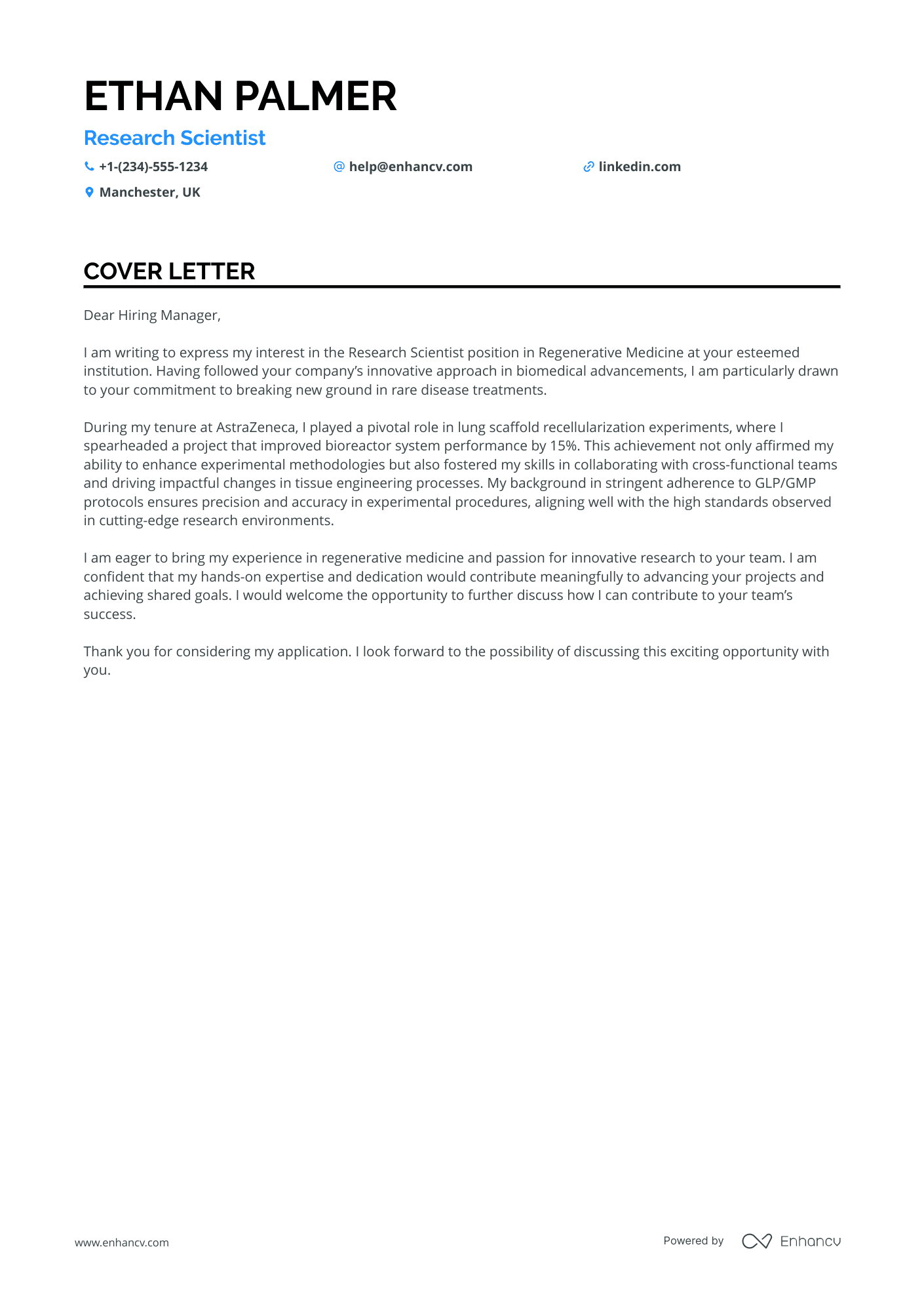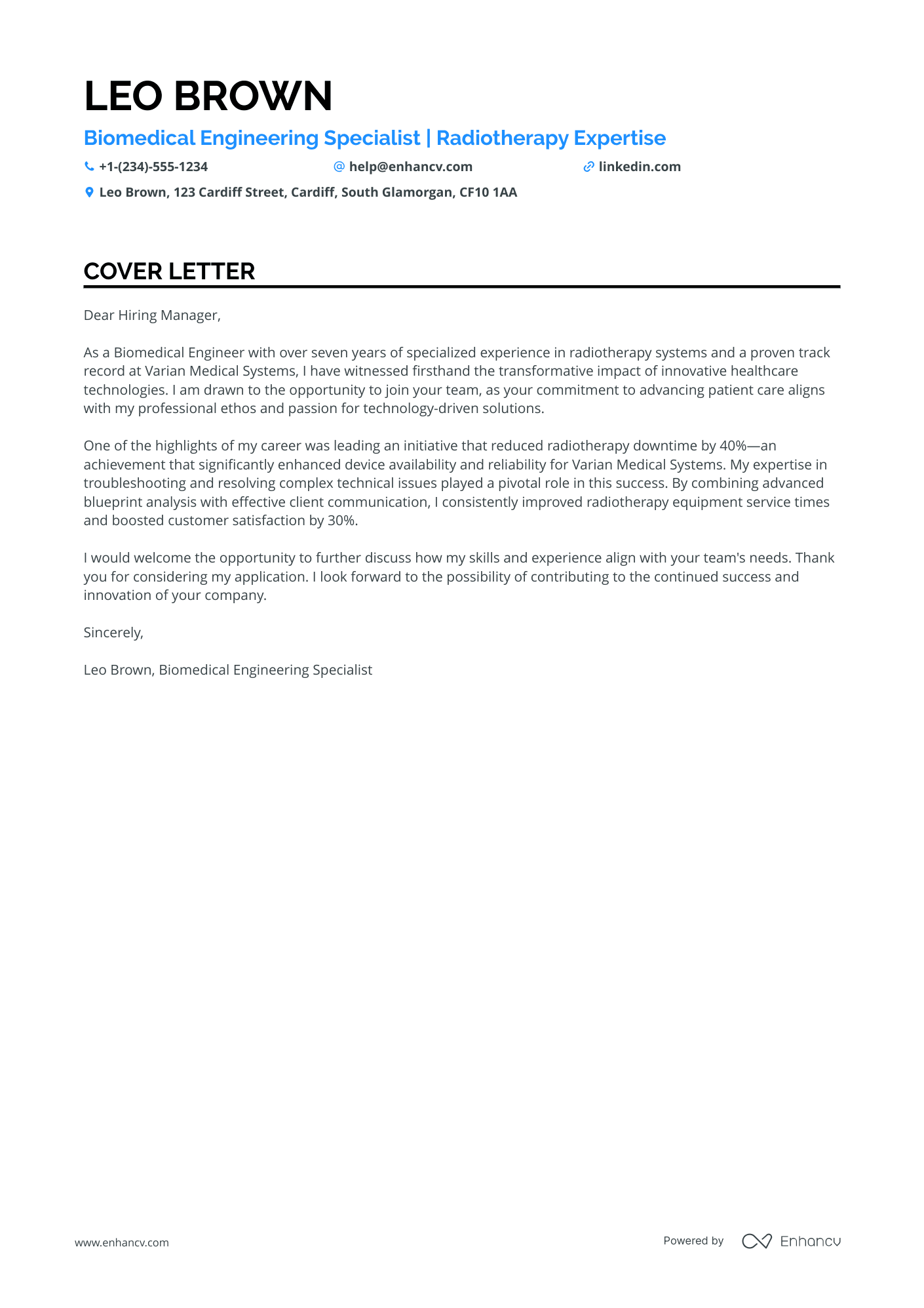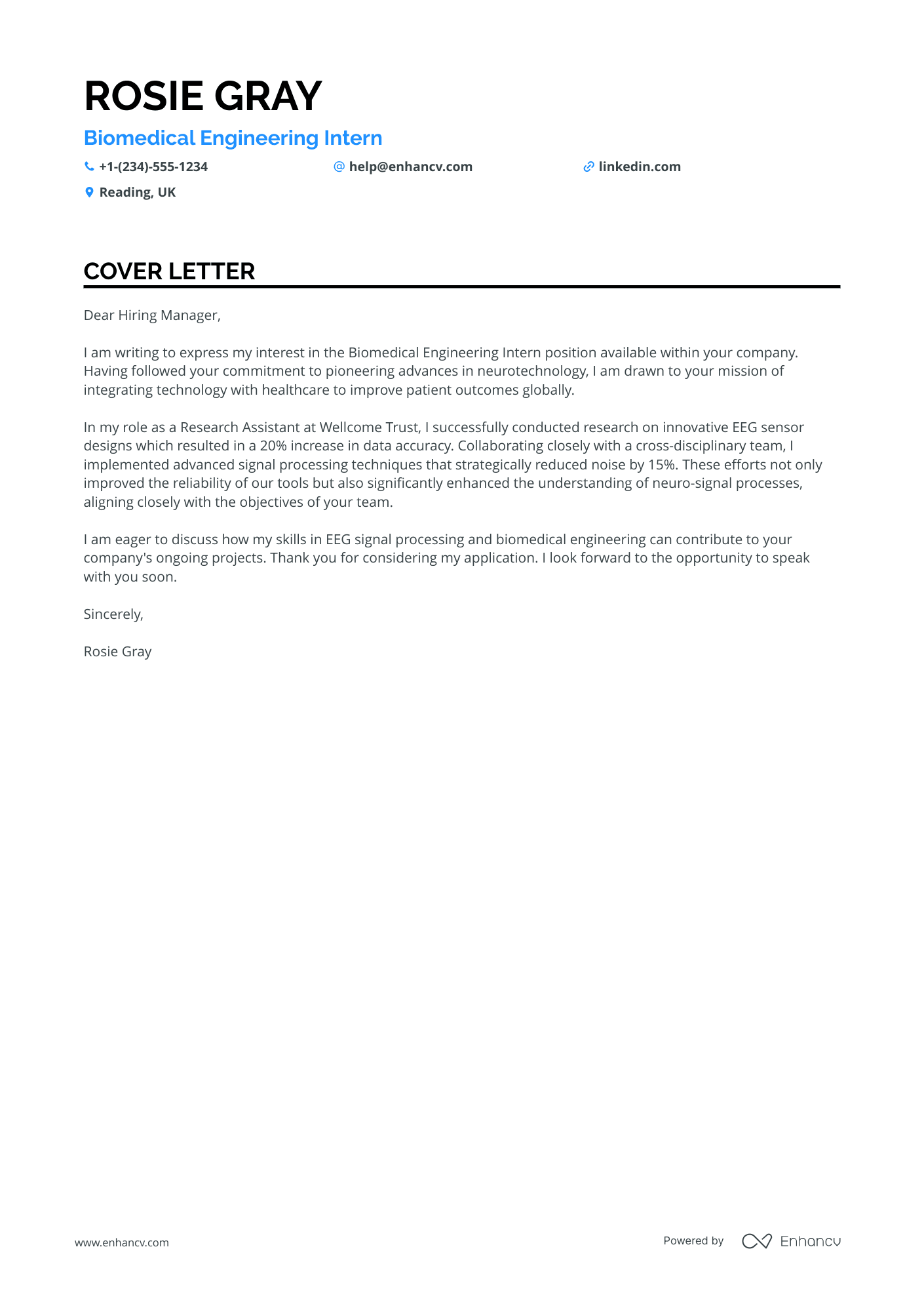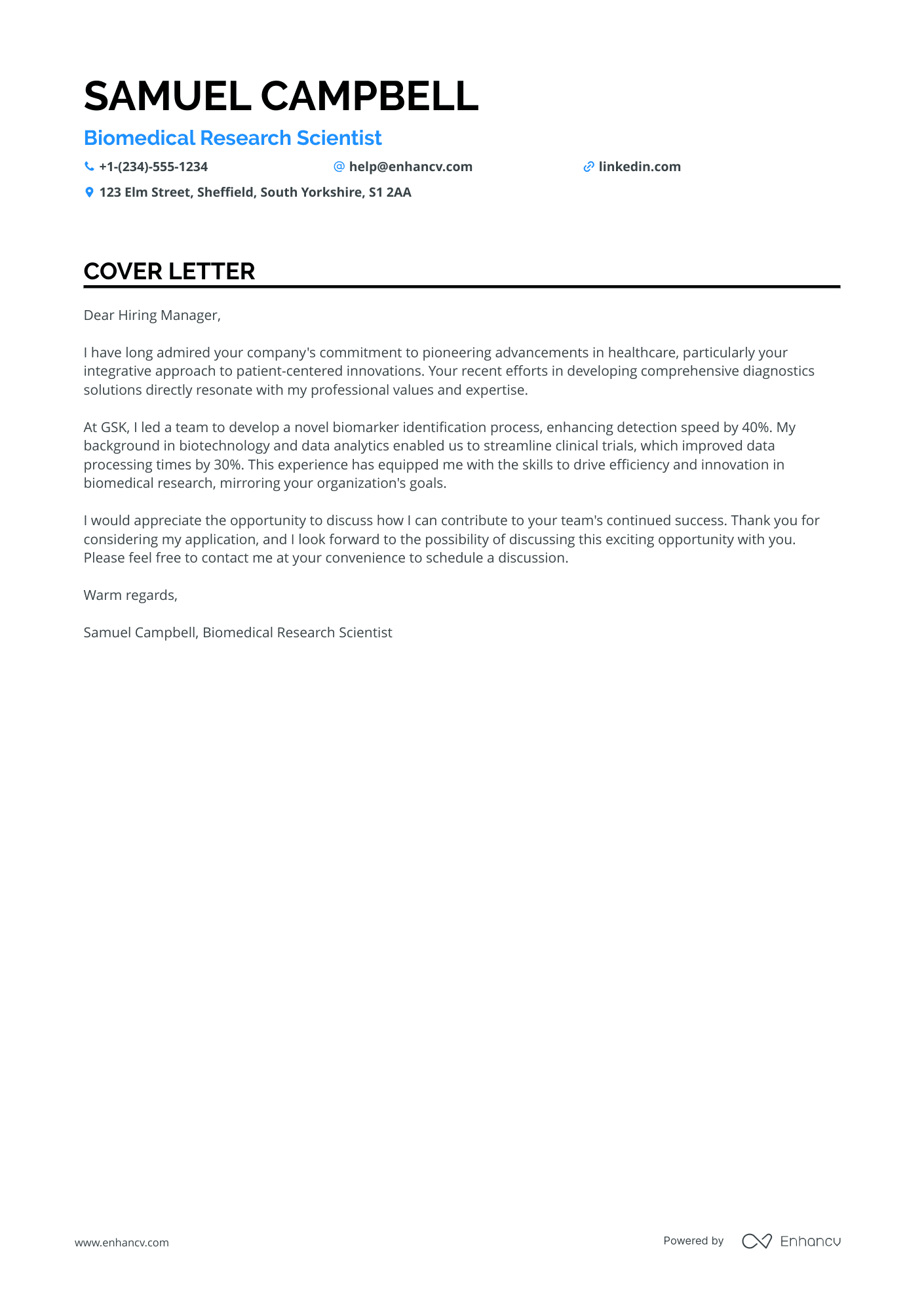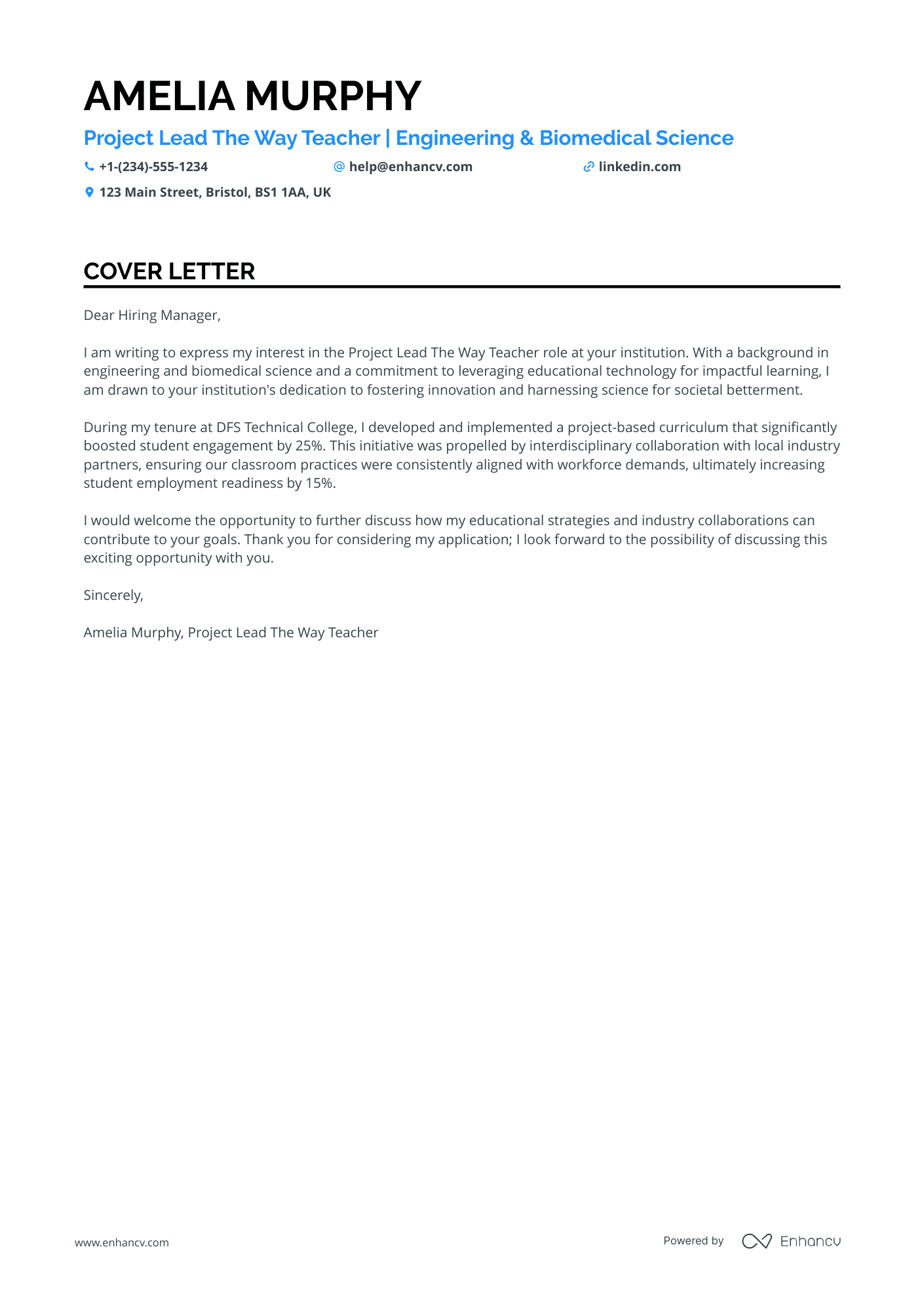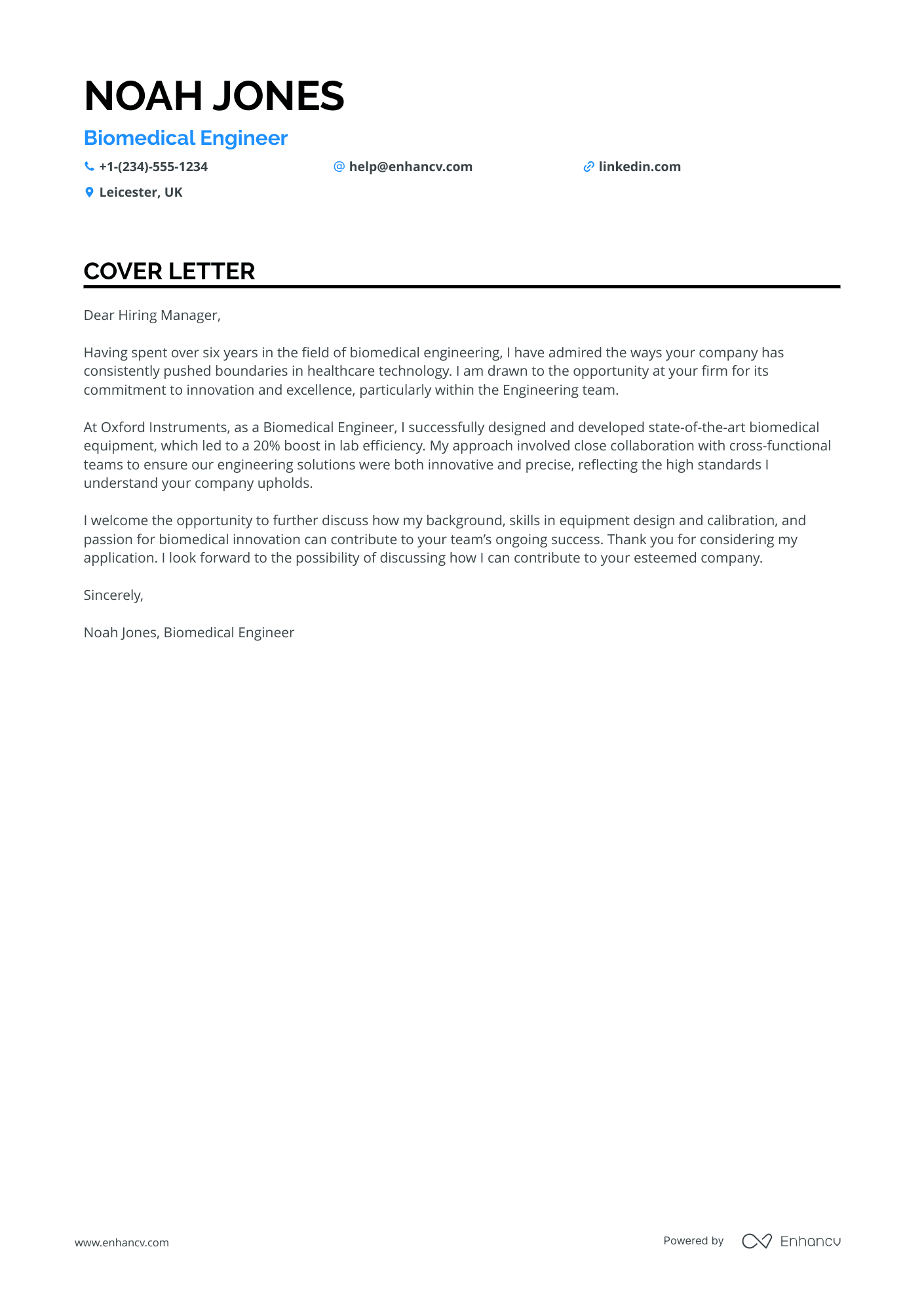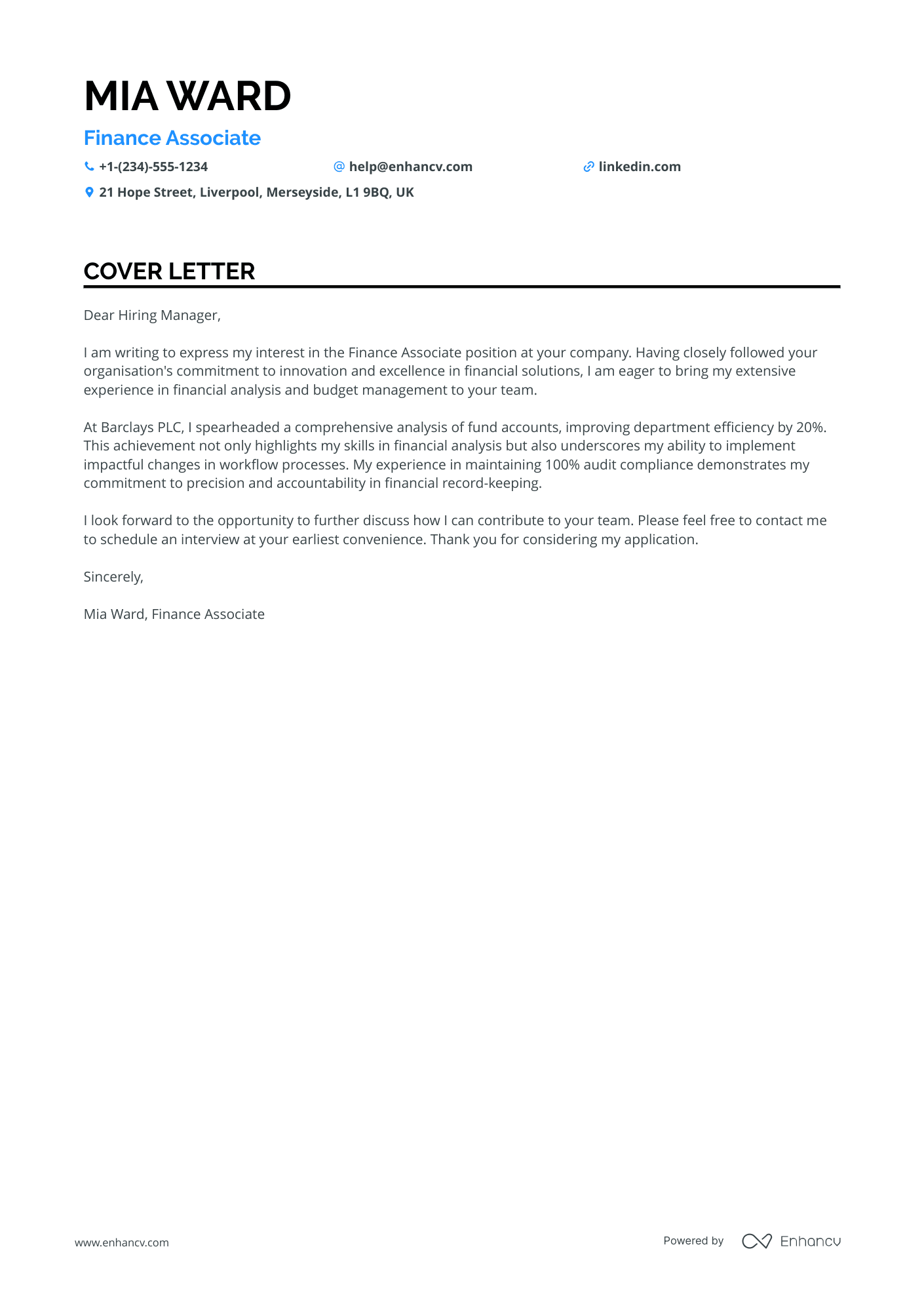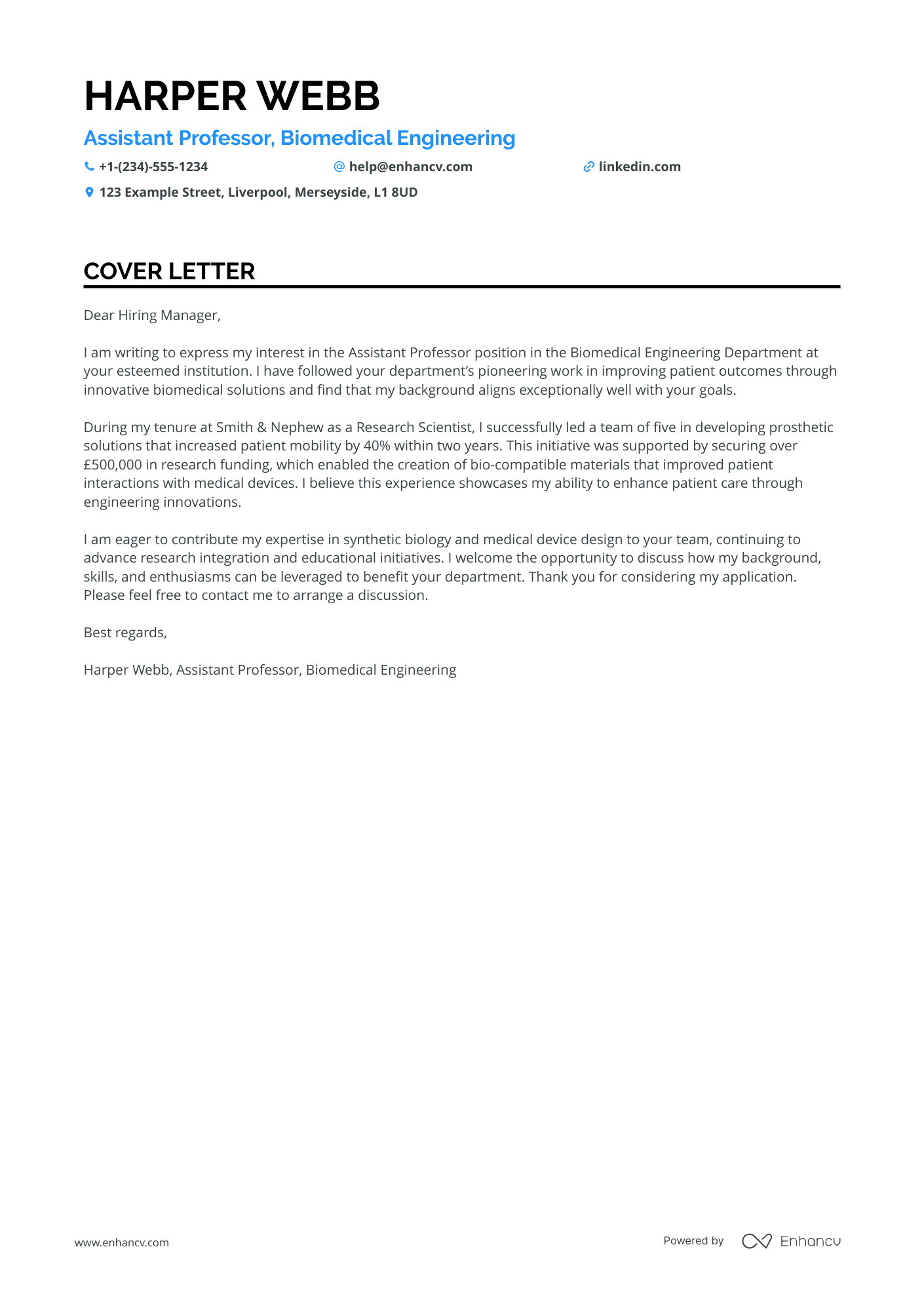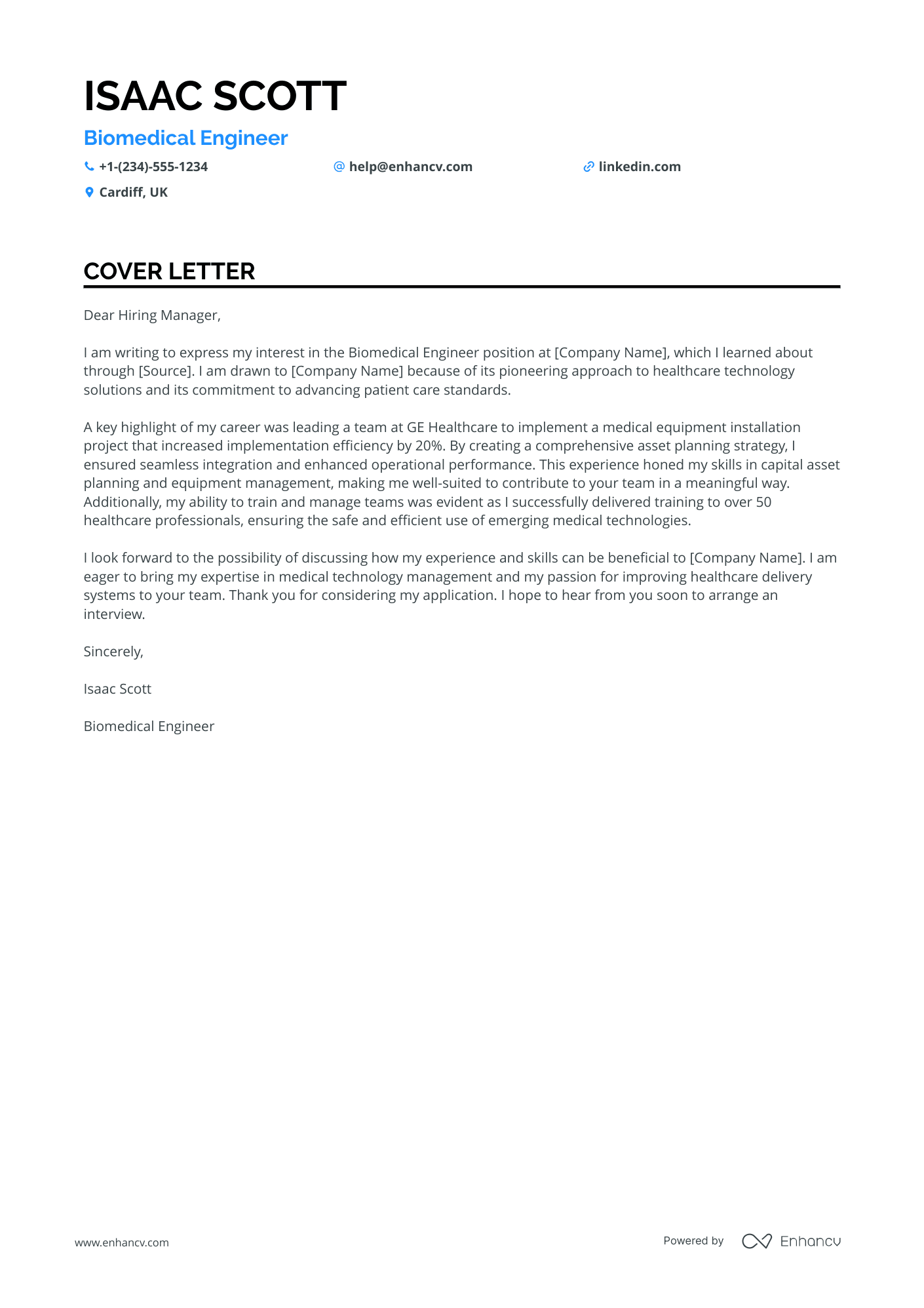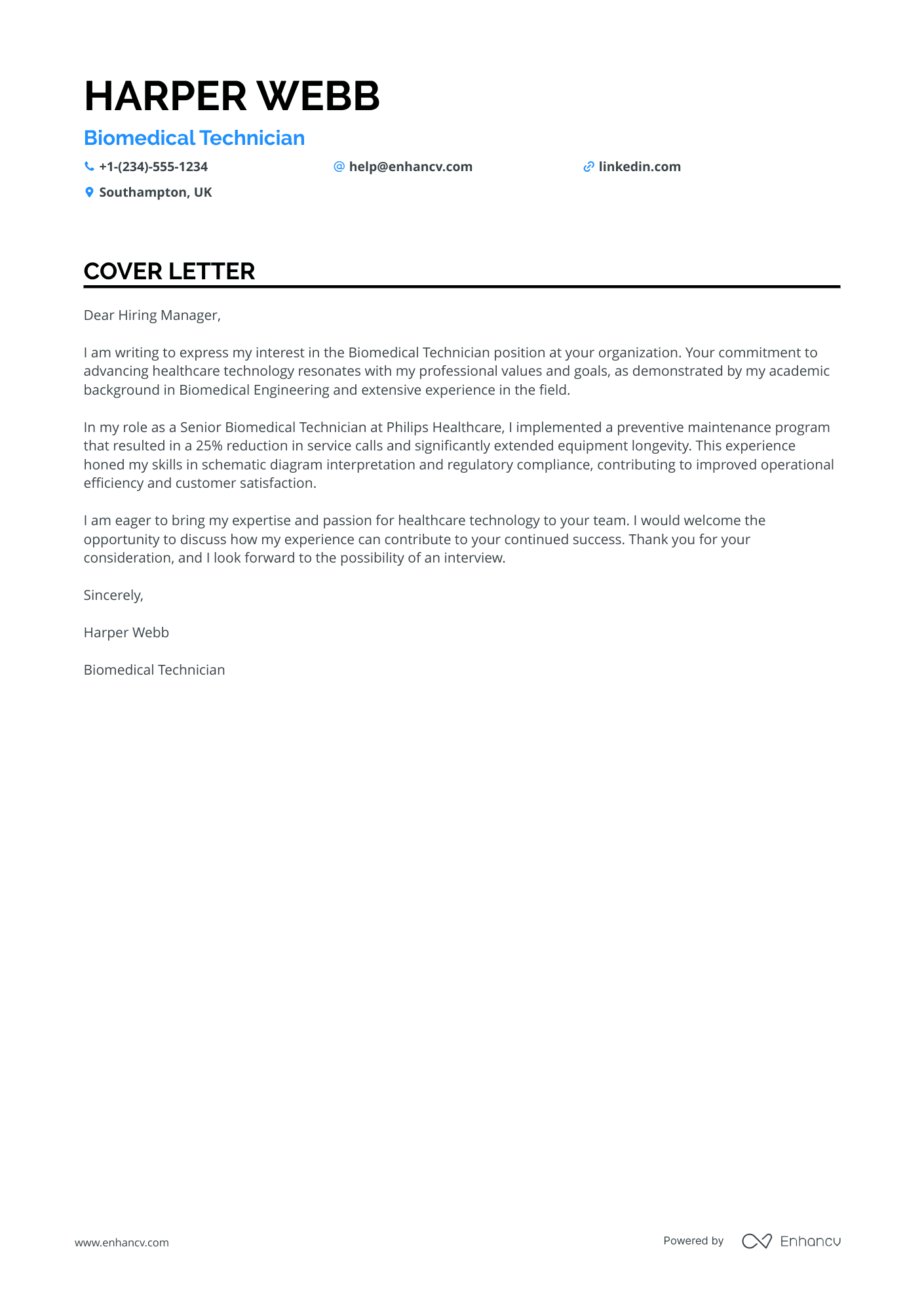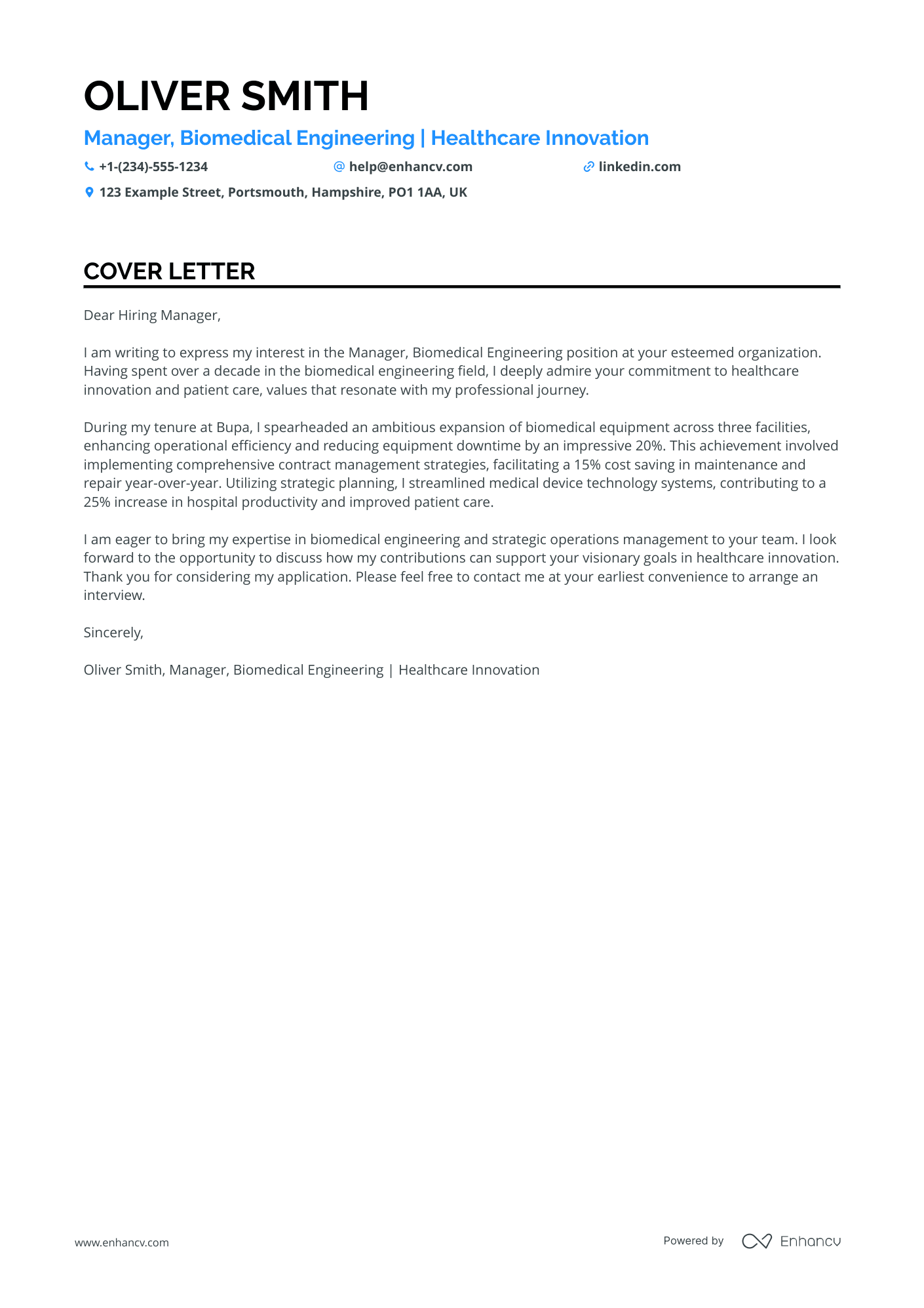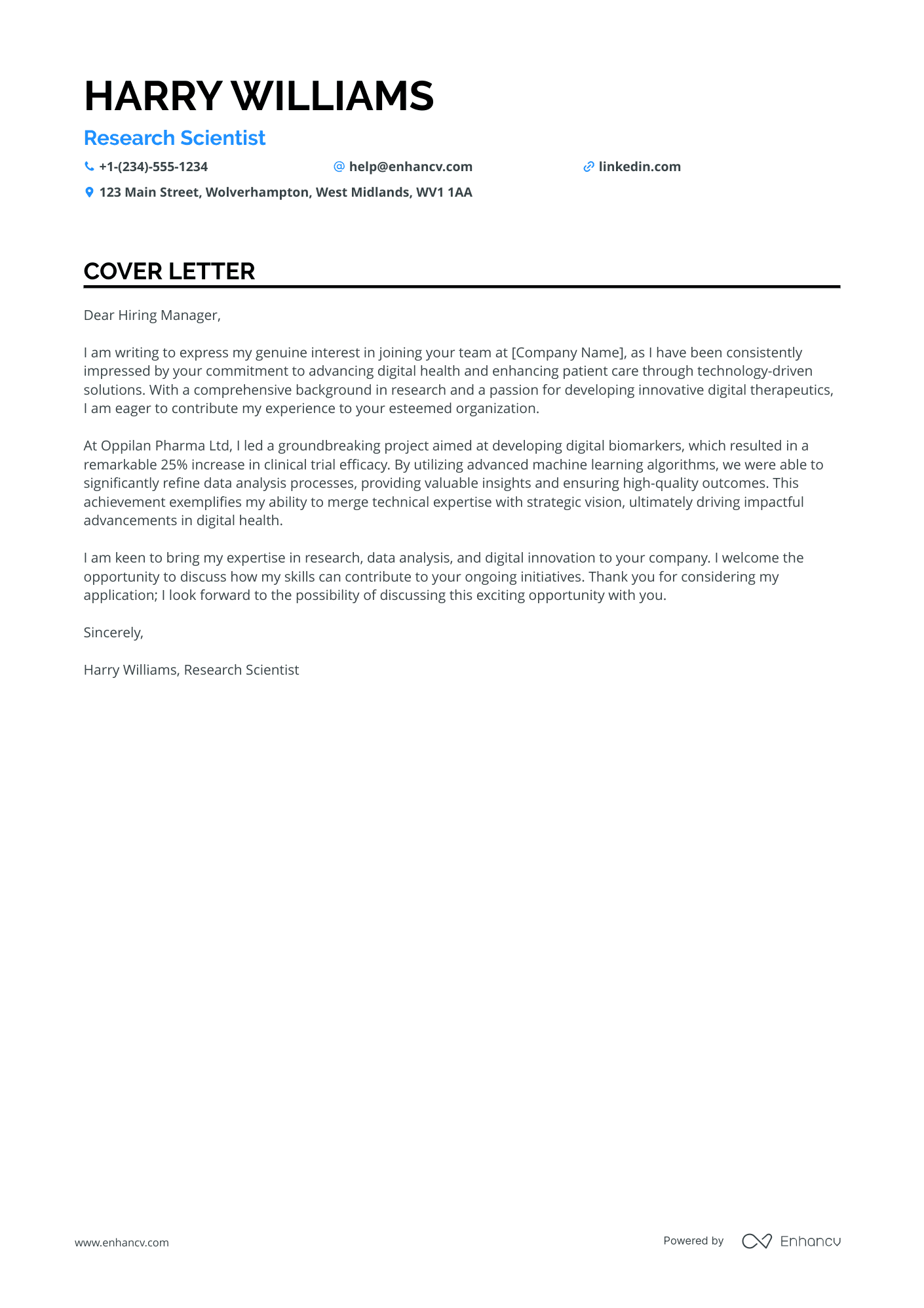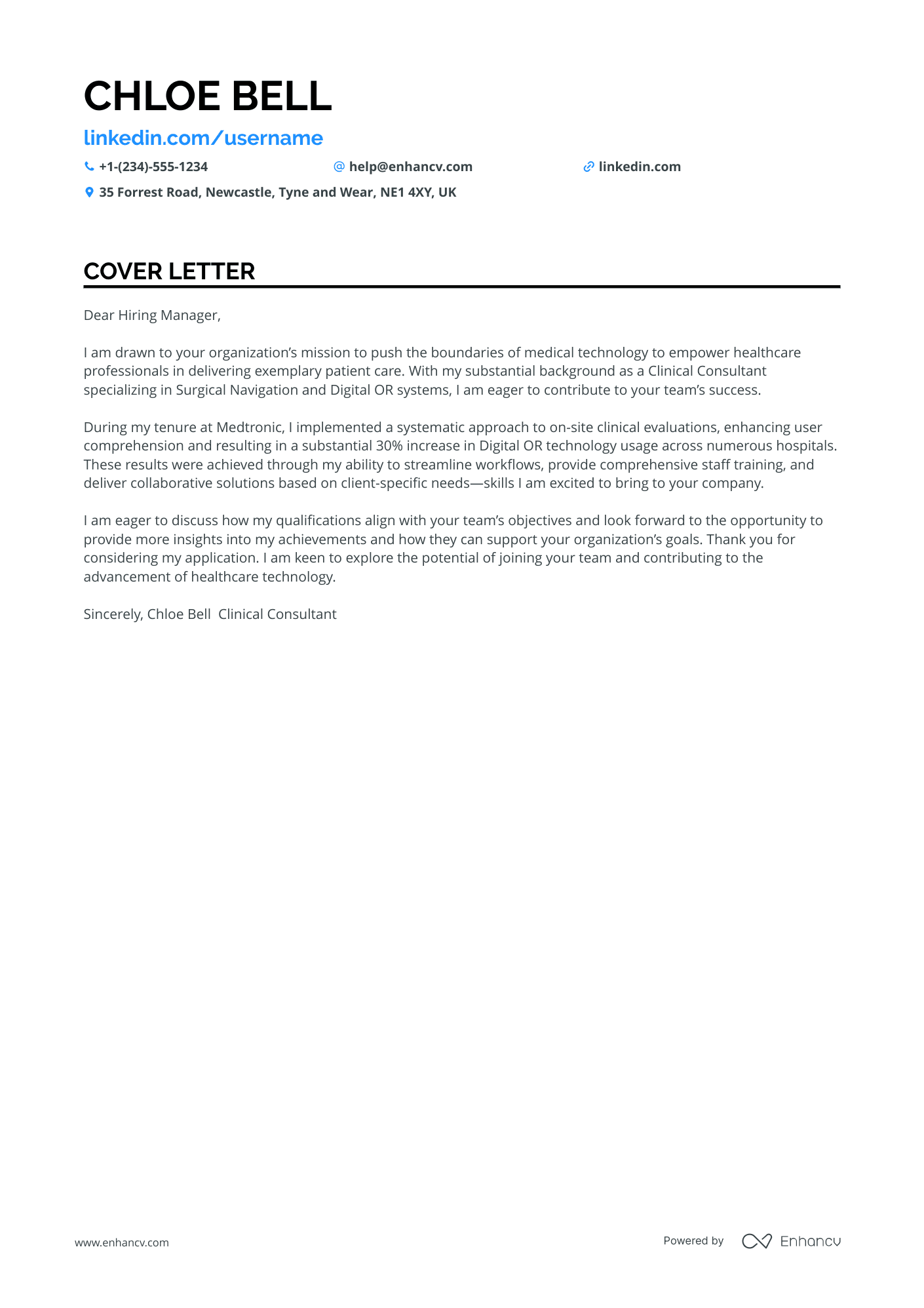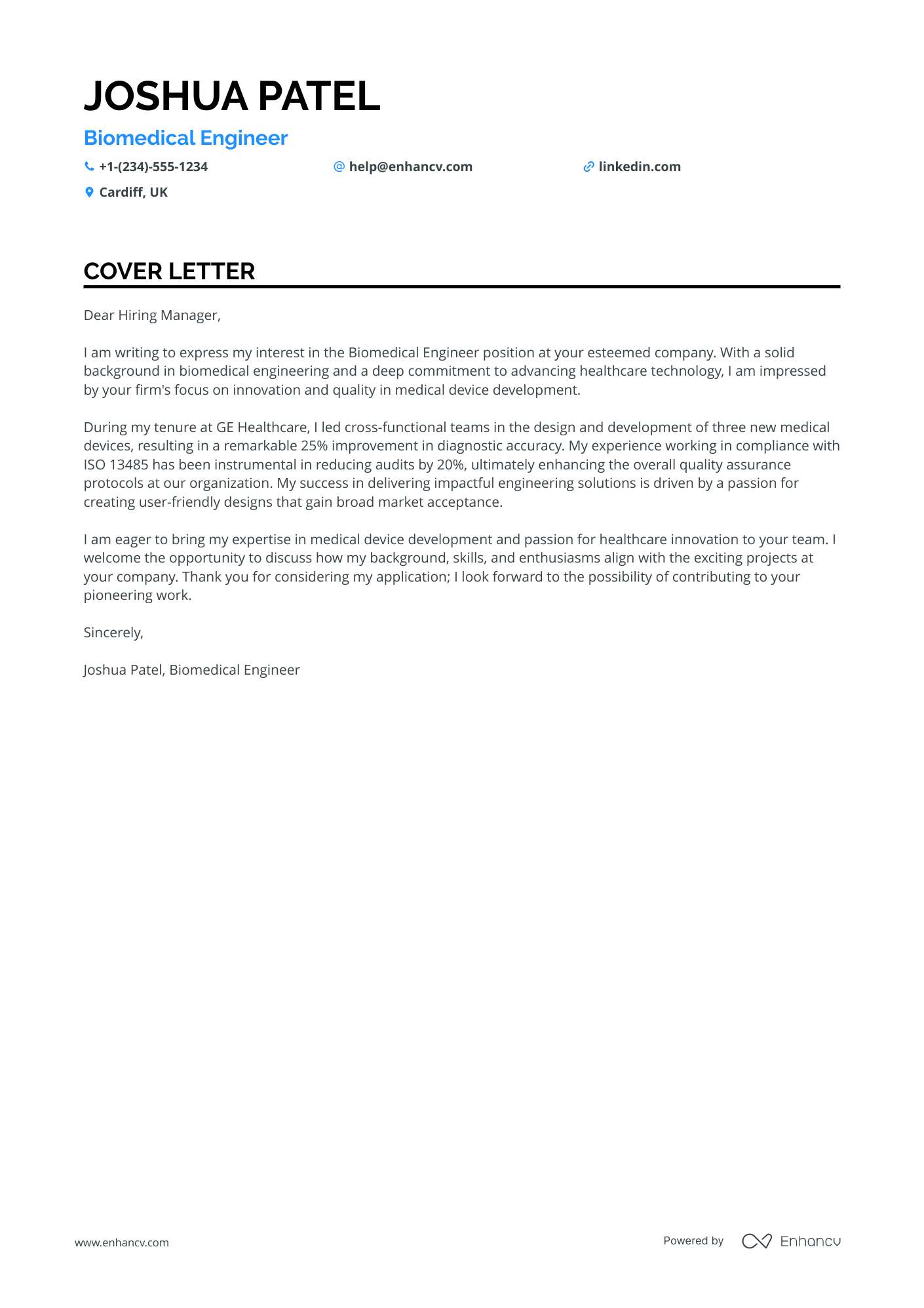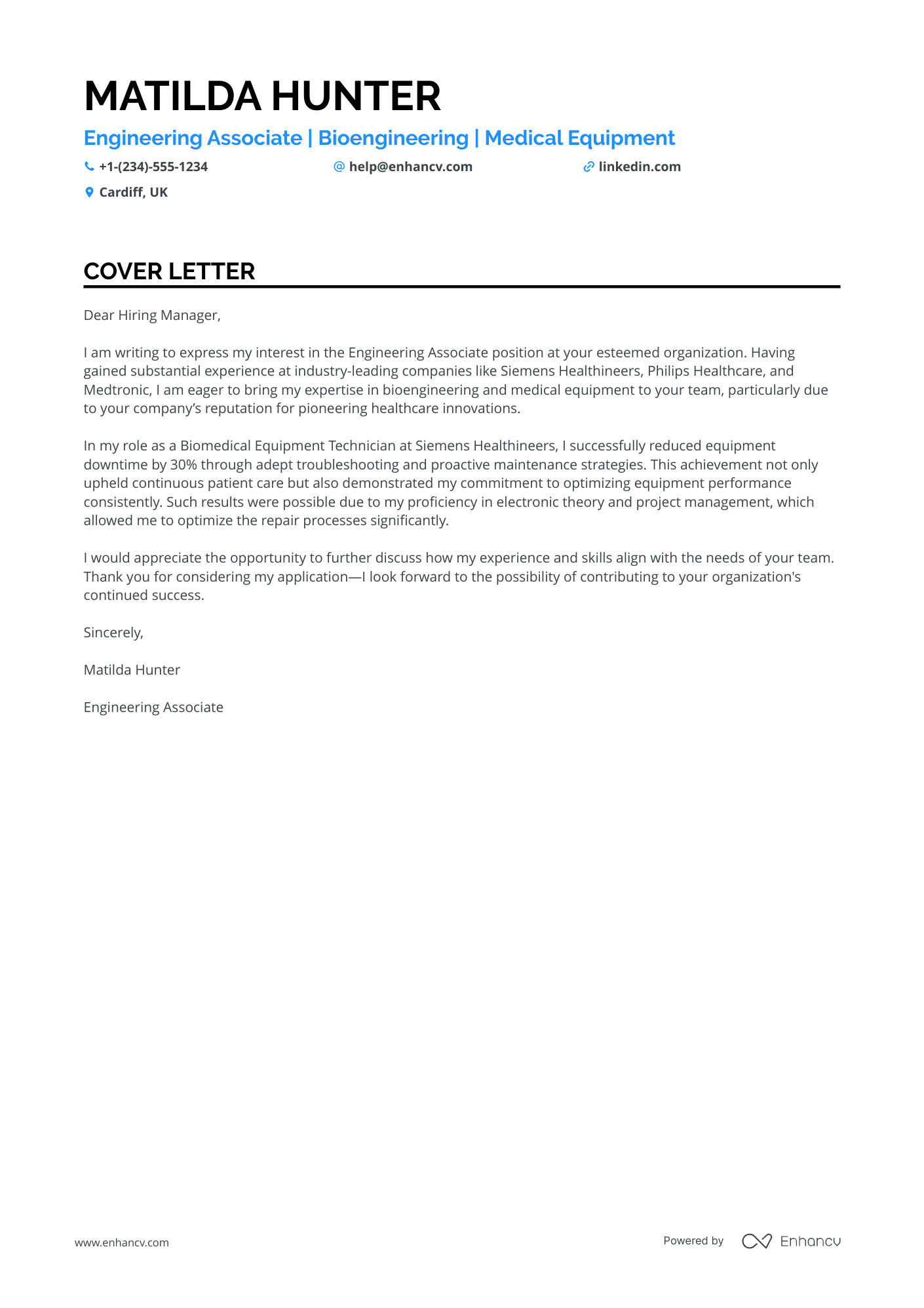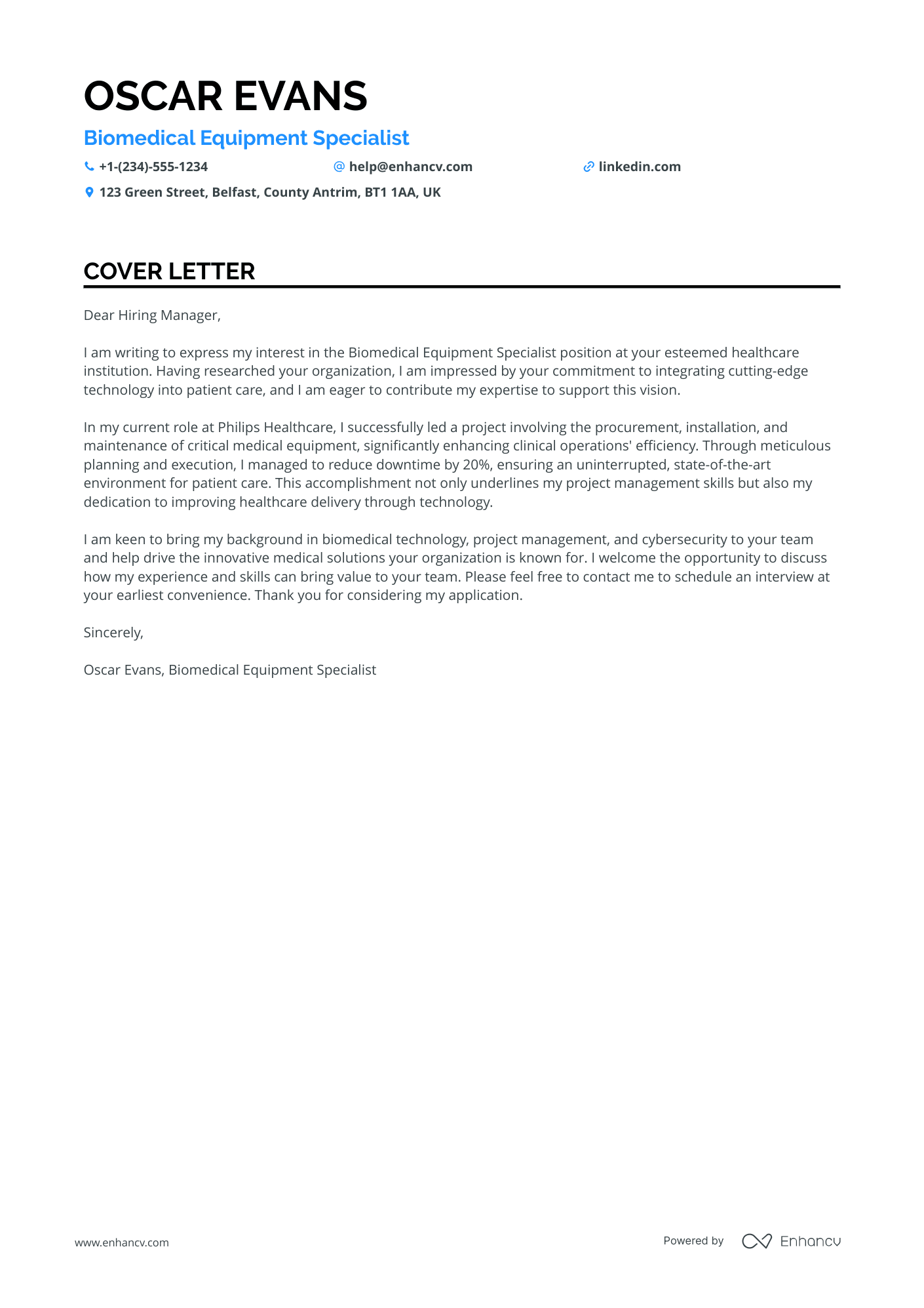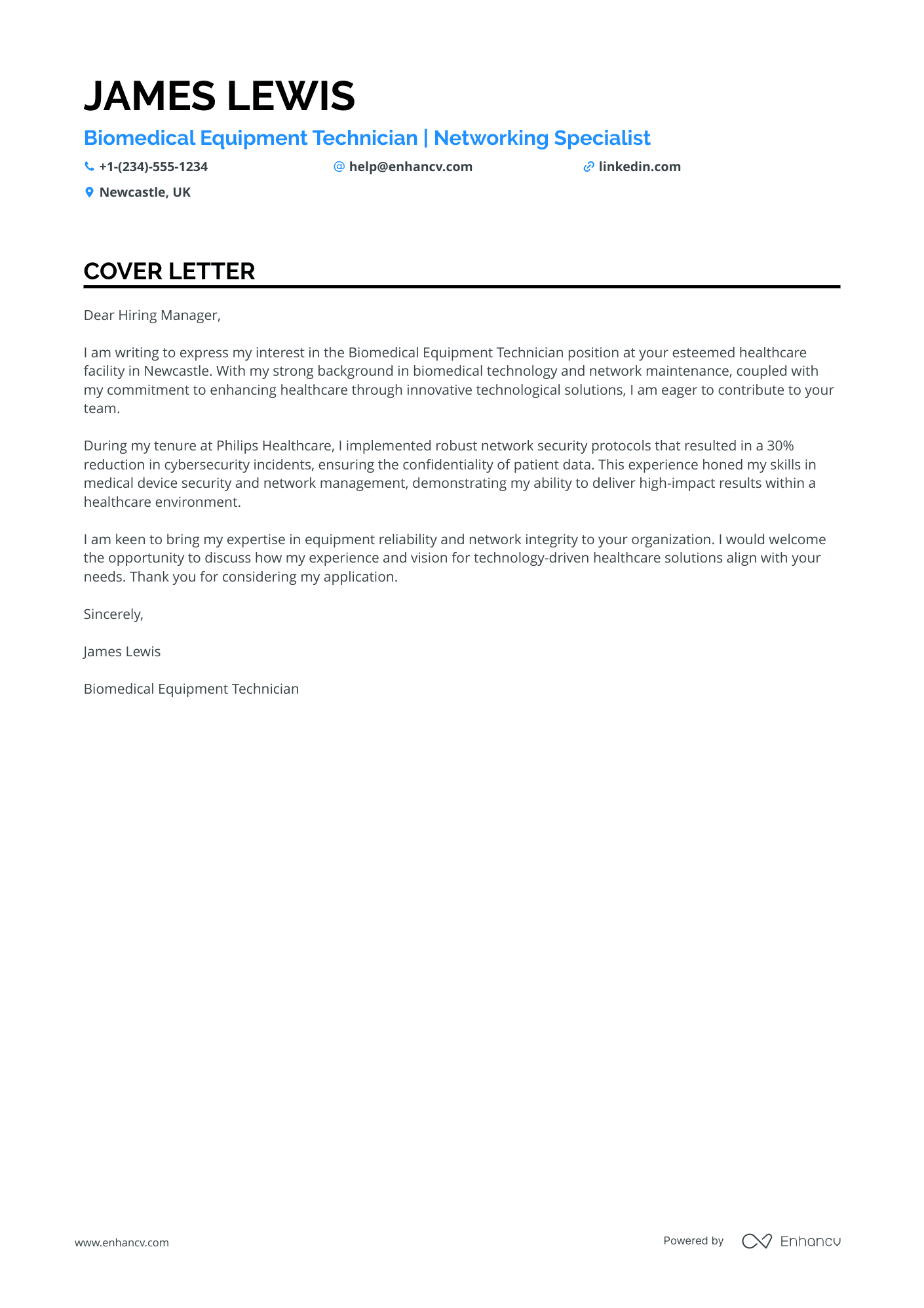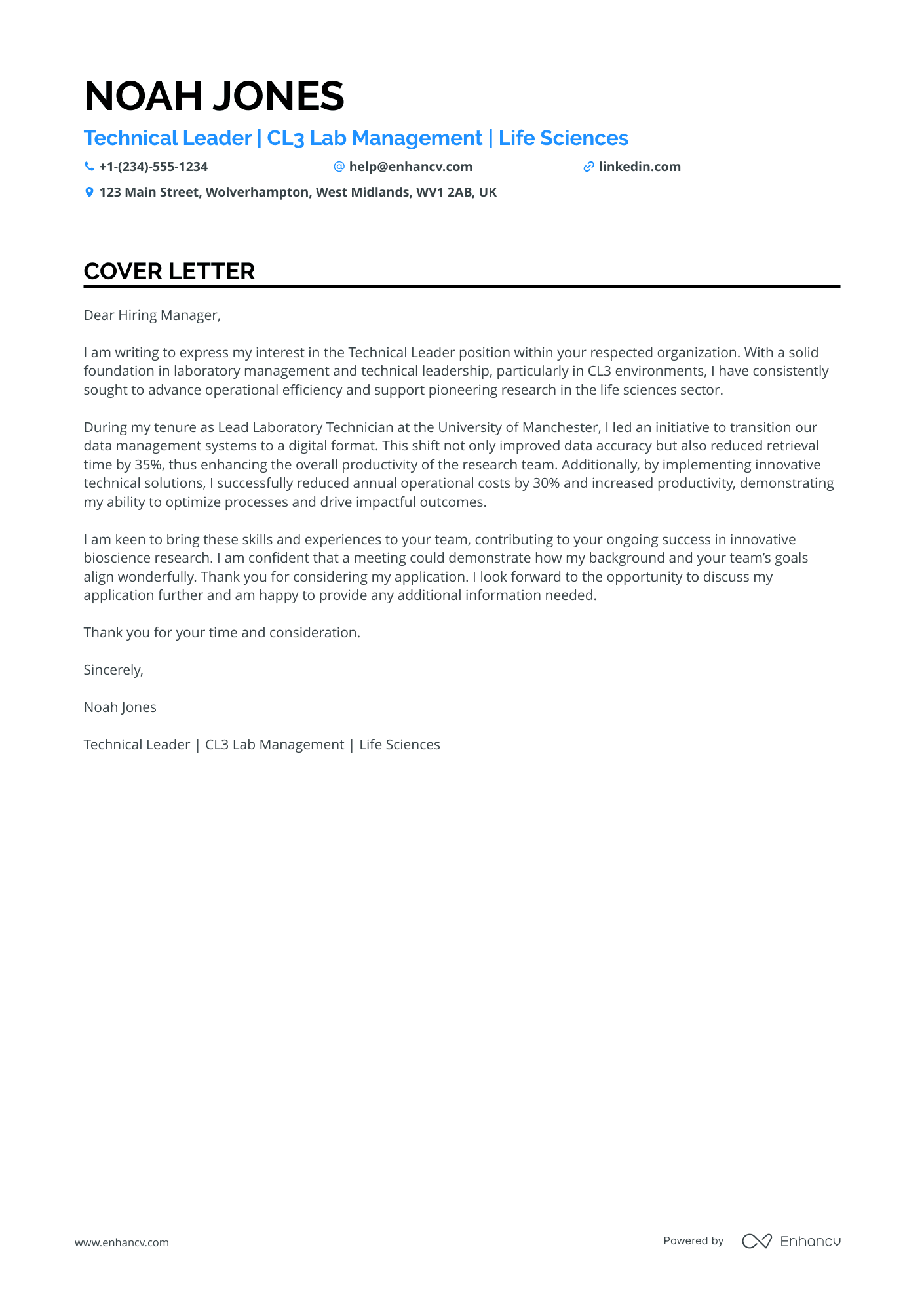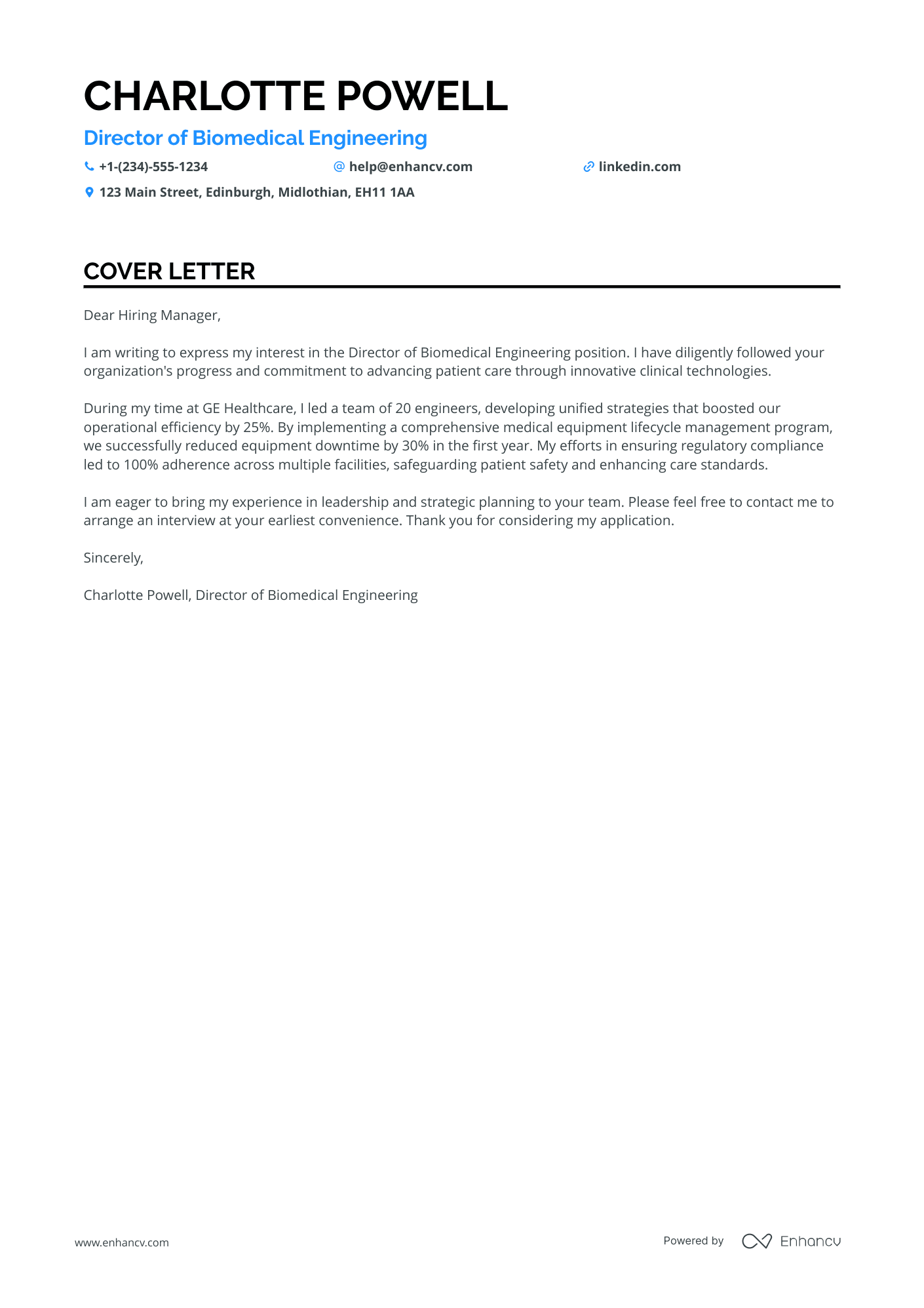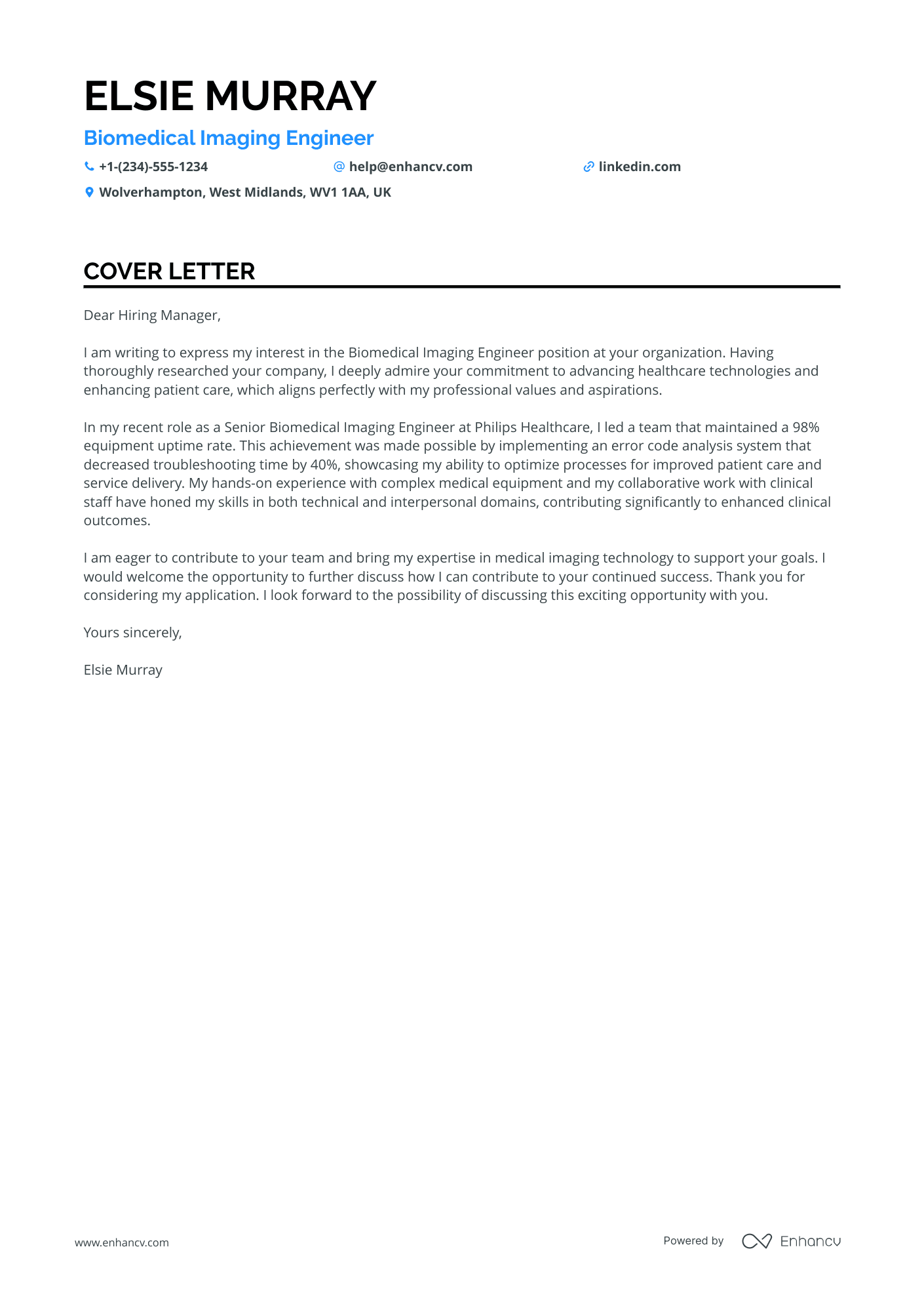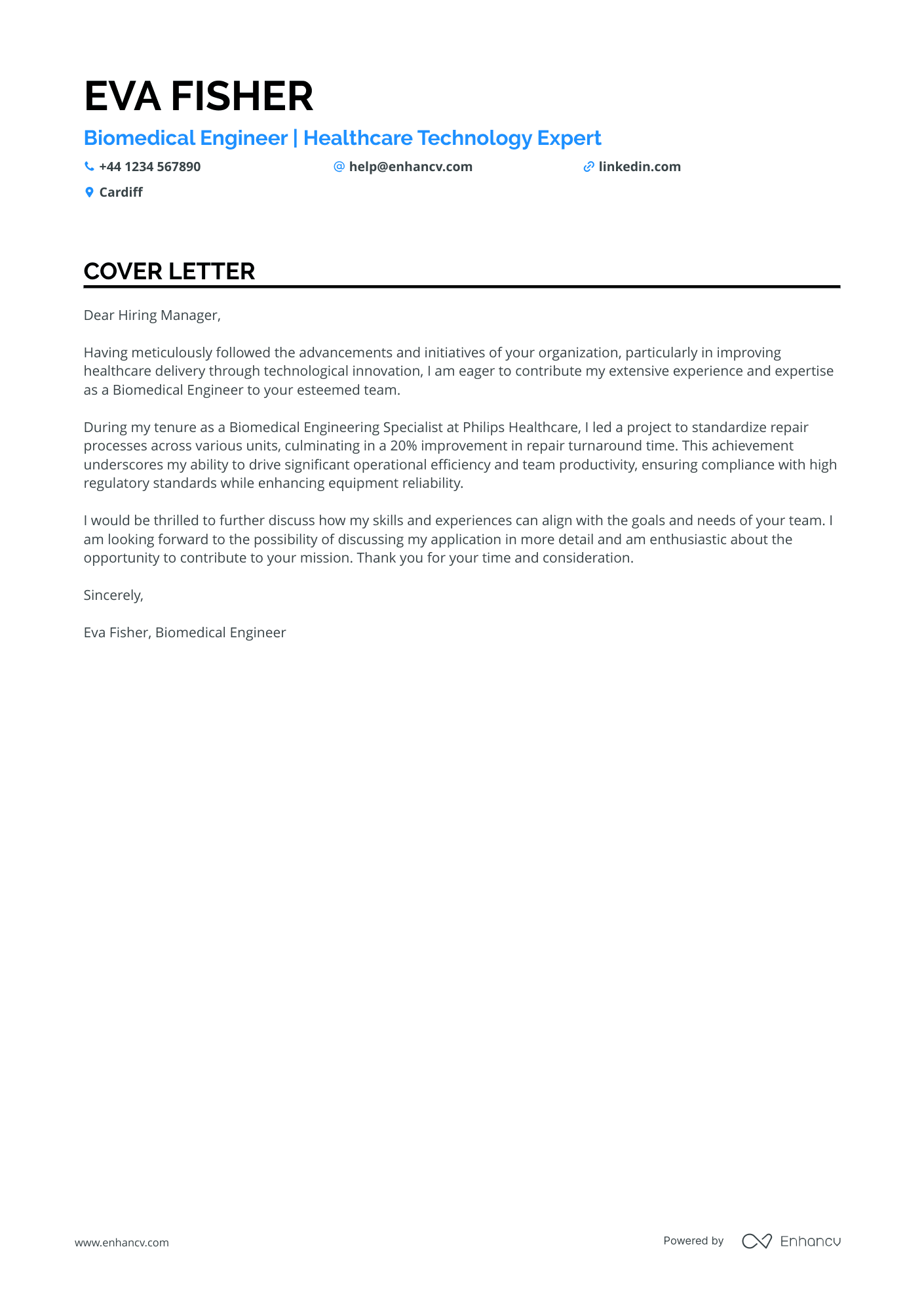You want your cover letter to strike the perfect balance between being professional and showing some personality. But how do you achieve this?
If you write too formally, your tone may come across as stiff. If you're too casual, it may sound overly conversational.
While modesty is always valued, how can you confidently present your skills without sounding arrogant or boastful?
This guide will help you find the right balance, ensuring your cover letter is both professional and personable, while focusing on the key job requirements.
Cover letter examples for biomedical engineer
By Experience
Junior Biomedical Engineer
- Specific Experience: The cover letter outlines specific experience in regenerative medicine, including spearheading experiments and collaborating on innovative techniques, which is crucial for a research scientist role.
- Adherence to Protocols: Emphasising proficiency in GLP/GMP protocols highlights the candidate's commitment to safety and accuracy, essential in scientific research environments.
- Achievements and Impact: By showcasing measurable achievements, such as improving bioreactor efficacy by 15%, the cover letter demonstrates the candidate’s ability to deliver tangible results.
- Relevant Courses and Continued Learning: The inclusion of relevant courses, like Tissue Engineering and Regenerative Medicine, underlines the candidate's dedication to continuous education and staying updated in the field.
Entry-Level Biomedical Engineer
- Emphasise pertinent certifications, such as "Advanced Radiotherapy Engineering" from Varian Medical Systems, when applying for specialised roles, to showcase understanding and expertise in cutting-edge technologies.
- Highlight notable achievements, such as reducing radiotherapy downtime by 40%, to demonstrate a track record of tangible results in improving operational efficiencies.
- Focus on skills crucial to the role, such as "Troubleshooting" and "Blueprint Interpretation," to align with the technical demands of a Biomedical Engineering Specialist position.
- Include customer service and team collaboration experience, showcasing the ability to handle client interactions and work effectively within multidisciplinary teams.
Biomedical Engineering Intern
- Relevant Experience: The cover letter effectively highlights the candidate's experience as a Research Assistant at the Wellcome Trust, which directly relates to the desired intern role by showcasing accomplishments like a 20% increase in data accuracy from innovative EEG sensor designs.
- Skills Emphasis: Emphasising skills such as EEG signal processing, MATLAB, and data analysis tailored to the biomedical engineering industry reinforces the candidate's expertise, enhancing their appeal to potential employers in neurotech.
- Notable Achievements: Including notable achievements like the ‘Innovative Research Presentation’ award and successful grant applications showcases the candidate’s proven track record in contributing to and leading impactful projects.
- Education and Courses: Highlighting relevant education, such as a Bachelor's degree in Biomedical Engineering from the University of Reading, and courses like "Advanced EEG Signal Processing" from Coursera, demonstrates a solid foundation and ongoing professional development in the field.
Graduate Biomedical Engineer
- Highlighting experience with cutting-edge technology: Samuel's participation in developing a biomarker identification process and his use of advanced data analytics tools in clinical trials demonstrate his capability to utilise new technologies to improve research efficiency and results.
- Emphasising leadership and collaboration skills: Samuel’s roles in leading a research team at GSK and coordinating cross-functional teams show his ability to manage and work within diverse teams, essential for senior project roles such as a Senior Biomedical Researcher.
- Showcasing research contributions and recognition: Samuel’s publication record and conference presentations underline his dedication to advancing the field of biomedical research and his recognition as a thought leader, adding credibility to his application.
- Relevant educational background and certifications: Samuel’s Master of Science in Biomedical Sciences from the University of Cambridge, combined with certifications in genomics and clinical trial management, provide a strong academic and technical foundation for specialised biomedical research roles.
Biomedical Engineering Team Lead
- Strong emphasis on curriculum development skills, highlighting the teacher's ability to enhance student engagement and align with job market needs.
- Shows substantial experience with project management and technical instruction, which are crucial for a Project Lead The Way Teacher position.
- Highlights innovative achievements, such as increasing engineering club membership by 40% and reducing lab-related incidents by 50% through improved safety protocols.
- Detail of advanced certifications in STEM education and safety practices indicates a commitment to professional growth and expertise in technical fields.
Principal Biomedical Engineer
- Emphasising a significant experience in designing and maintaining biomedical equipment, particularly noting the achievement of a 20% efficiency boost in lab operations, aligns well with the technical focus of a Biomedical Engineer role.
- Highlighting certifications in "Advanced Sensor Technologies" and "Biomedical Equipment Maintenance and Management" showcases continuous professional development and specialised knowledge, which are valuable in the biomedical engineering field.
- Including notable achievements, such as the "Innovation in Bioengineering Award" for developing a new sensor calibration system and the "Employee of the Year" for enhancing equipment efficiency, demonstrates proven success and recognition in the industry.
- Mentioning proficiency in both English and Spanish can be advantageous for roles that require collaboration with international teams or clients, broadening the communication capabilities of the candidate.
Associate Biomedical Engineer
- Highlighting Certifications: The cover letter effectively underscores the importance of the Certified Management Accountant (CMA) certification, which is crucial for roles demanding expertise in financial accounting and strategic management.
- Relevant Professional Experience: Emphasising Mia's role in large organisations such as Barclays PLC and Lloyds Banking Group, which adds credibility and reflects her capability in handling complex financial tasks.
- Proven Track Record of Achievements: Focus on specific accomplishments like the "Budget Optimization Initiative" and "Audit Excellence Recognition," illustrating Mia's proficiency in cost reduction and compliance excellence.
- Demonstrating Soft Skills: Incorporating experiences related to training and representing departments in committee meetings, indicating strong communication skills and leadership qualities.
Experienced Biomedical Engineer
- Highlighted Expertise: The cover letter effectively emphasises Harper Webb's vast experience in Biomedical Engineering, particularly in synthetic biology and medical device design, which are crucial areas for the role of an Assistant Professor.
- Proven Track Record: It showcases a successful history of securing significant research grants and authoring numerous peer-reviewed publications, both of which are essential for an academic career.
- Concrete Achievements: The letter includes specific achievements such as the development of innovative prosthetic solutions and contributing to a 20% reduction in manufacturing costs, underlining the practical impact of Harper’s work.
- Interdisciplinary Collaboration: Highlighting collaboration with industry and educational institutions demonstrates the ability to work across disciplines, which is significant for research integration roles.
Chief Biomedical Engineer
- Targeted Experience Highlight: Emphasising over 14 years of direct experience in biomedical engineering and technology integration, showcasing a deep understanding of the field and a proven track record of expertise in relevant roles.
- Certifications for Credibility: Highlighting advanced certifications such as the Advanced Biomedical Equipment Technology from AAMI, which underscores specialised knowledge and commitment to professional development in medical instrumentation.
- Achievements and Impact: Clearly detailing the positive outcomes of previous initiatives, such as the successful management of a recall programme, demonstrating the ability to deliver results that significantly enhance operational safety and efficiency.
- Skills Alignment: Focusing on skills like compliance and safety standards, capital asset planning, and equipment lifecycle management, aligning with critical aspects of the role and industry requirements, thus reinforcing the candidate's suitability.
By Role
Biomedical Engineering Technician
- Emphasising the Preventive Maintenance Program Implementation at Philips Healthcare, showcasing a significant 25% reduction in service calls, highlights proactive capabilities essential for a Biomedical Technician role.
- Highlighting achievements such as the Customer Satisfaction Award demonstrates exceptional customer relationship management, a crucial aspect when working directly with healthcare professionals and institutions.
- Noting advanced Electronic Digital Circuitry skills and accurate troubleshooting of electro-mechanical devices underlines the technical competence required for diagnosing complex equipment issues successfully.
- Detailing experiences with Regulatory Compliance, both within the job role and through specialised courses, underscores an understanding of safety and ethical standards critical in healthcare environments.
Biomedical Engineering Project Manager
- Emphasis on Relevant Experience: The cover letter effectively highlights over a decade of experience in biomedical engineering management, showcasing a proven track record of success in the field, which is crucial for leadership roles in healthcare innovation.
- Highlight on Achievements: It prominently mentions significant achievements such as a 20% reduction in equipment downtime and a 15% cost saving in maintenance, demonstrating tangible results that reinforce the candidate's expertise and impact in previous roles.
- Strategic Skills and Expertise: The inclusion of skills such as budget planning, regulatory compliance, and strategic planning, along with leadership experience, paints a comprehensive picture of the candidate's capability to manage complex projects in the biomedical engineering domain.
- Alignment with Role Requirements: The focus on advanced biomedical engineering courses and certifications shows the candidate’s commitment to professional development and industry-relevant knowledge, which are essential for staying current in a rapidly advancing field.
Biomedical Engineering Research Fellow
- Industry-Specific Experience: Emphasises seven years of research experience in digital health and wearable data, showcasing relevant expertise for the role of a research scientist in this specialised field.
- Quantifiable Achievements: Highlights measurable successes such as reducing fall incidents by 30% and increasing clinical trial efficacy by 25%, which demonstrates tangible impact and capability.
- Leadership and Mentorship: Mentions successful mentorship resulting in a considerable number of publications and leading interdisciplinary teams, indicating strong leadership qualities necessary for a senior role.
- Funding Success: Clearly states success in securing £1.5 million in research funding, showing an ability to support and expand research initiatives financially.
Biomedical Engineering Consultant
- Highlighting certifications such as the "Certified Surgical Device Specialist" from AAMI can emphasise specialised expertise and commitment to enhancing device integration and surgical team training for roles in clinical consulting and surgical navigation.
- Emphasising the quantifiable improvements and efficiencies achieved, like a 30% increase in Digital OR usage or reducing installation setup times by 25%, showcases a track record of noteworthy accomplishments crucial for roles focused on digital healthcare and technology utilisation.
- Incorporating unique skills such as "Surgical Navigation" and "Digital OR Systems" aligns strongly with the role’s technical requirements, underlining the candidate's specific technical competencies and experiences.
- Mentioning achievements such as "Service Contract Optimization," which resulted in a 20% increase in contract renewals, indicates a deeper understanding of customer relationship management which is valuable in roles requiring client interaction and satisfaction.
Clinical Biomedical Engineer
- Highlighted Certifications: Emphasizing certifications such as ISO 13485 showcases compliance with critical medical device quality standards, which is essential for roles in biomedical engineering.
- Demonstrated Technical Skills: Mentioning specific skills like Python programming and mathematical modelling demonstrates proficiency in key areas necessary for medical device design and data interpretation.
- Impactful Project Experience: Detailing projects that led to measurable improvements, such as a 40% efficiency boost through the use of Python, provides concrete evidence of technical prowess and problem-solving capabilities.
- Leadership and Mentoring: Discussing mentoring of junior engineers and leading cross-functional teams highlights soft skills important for senior roles and team productivity improvement.
Biomedical Engineering Analyst
- Emphasising certifications and courses such as "Advanced Biomedical Equipment Troubleshooting" and "Regulatory Compliance for Healthcare" underlines expertise in both technical and compliance aspects critical for biomedical engineering roles.
- Highlighting skills in electronic theory and project management, as well as hands-on experience with specific equipment like Philips PICiX and Intellivue monitoring, positions the candidate as well-rounded and immediately effective in a new role.
- Incorporating quantitative achievements, such as boosting efficiency by 20% and reducing equipment downtime by 30%, effectively showcases the candidate's impact in previous positions.
- Demonstrating leadership and teamwork through roles such as leading a team during operational upgrades and training junior staff can effectively convey the candidate’s ability to manage and work collaboratively in a medical engineering context.
Biomedical Engineering Systems Specialist
- Emphasising Certifications: The inclusion of certifications such as the Certified Biomedical Equipment Technician adds credibility and highlights specialised skills, essential for a technical role like a Biomedical Equipment Specialist.
- Demonstrating Technical Proficiency: Highlighting specific technical skills such as cybersecurity, network troubleshooting, and server maintenance showcases the candidate's readiness to handle complex biomedical systems effectively.
- Showing Impact Through Achievements: The presence of quantifiable achievements, such as reducing equipment downtime by 30%, effectively demonstrates the candidate's contribution to optimising organisational operations and reliability.
- Passion and Continual Development: Communicating a passion for healthcare technology and a commitment to continuous learning reassures potential employers of the candidate's dedication to staying updated in this rapidly evolving field.
Biomedical Equipment Engineer
- Highlight relevant specialisations: Emphasise expertise in Cerner EHR systems integration, a crucial skill for enhancing hospital system efficiency, as seen by the 25% increase in staff productivity.
- Demonstrate impact: Showcase achievements such as network security protocols that reduced cybersecurity incidents by 30%, illustrating direct contributions to patient data confidentiality and safety.
- Quantify achievements: Use precise figures like "15% increase in equipment lifespan" or "40% boost in data transmission speed" to substantiate claims, showing clear outcomes of technical interventions.
- Showcase innovation: Highlight achievements such as the introduction of new network standards that improved medical device communication efficiency by 30%, demonstrating a commitment to advancing healthcare technology.
Biomedical Engineering Operations Manager
- Highlight specialized skills and experience: The cover letter effectively showcases Noah's proficiency in CL3 laboratory management and technical leadership, which are crucial for roles in life sciences and laboratory settings.
- Emphasise achievements and impact: By mentioning specific achievements like improving research efficiency by 25% and reducing operational costs by 30%, the cover letter demonstrates Noah's ability to create significant contributions and improvements.
- Focus on leadership and team development: The cover letter emphasises Noah's experience in developing and mentoring junior technicians, illustrating leadership and team-building skills, which are vital for a technical leader position.
- Reference relevant certifications and training courses: Mentioning courses such as 'Advanced Biosafety Practices' highlights Noah's commitment to maintaining high safety standards and continuous learning, both critical in laboratory environments.
Biomedical Engineering Director
- Emphasise Leadership and Team Management: Highlight leadership experience by demonstrating successful team management at GE Healthcare where significant efficiency and cost improvements were achieved under your guidance.
- Focus on Regulatory Compliance and Process Improvement: Stress the importance of regulatory compliance, particularly the 100% compliance rate achieved, and discuss how process improvements have led to operational efficiencies.
- Highlight Certifications and Continuous Learning: Mention specialised courses such as the Certified Healthcare Technology Manager (CHTM) to showcase expertise in healthcare technology management and commitment to ongoing professional development.
- Stress Cross-Functional Collaboration and Innovative Solutions: Explain the importance of collaboration between clinical and IT departments and how technology integration has enhanced clinical workflows and patient care.
Senior Biomedical Engineer
- Highlighting leadership skills through roles such as leading teams at Philips Healthcare, which is crucial for senior engineering positions.
- Emphasising achievements in improving operational efficiency, such as the 98% equipment uptime rate and a 30% increase in preventative maintenance efficiency.
- Showcasing technical skills, including system security and error code analysis, which are essential for maintaining and securing advanced medical imaging equipment.
- Demonstrating a commitment to ongoing professional development through relevant courses and advanced educational qualifications in Medical Imaging Technology.
Biomedical Engineer cover letter example
Eva Fisher
Cardiff
+44 1234 567890
help@enhancv.com
- Highlight specific achievements that demonstrate your ability to improve operational efficiency, such as leading projects that resulted in significant improvements in processes or outcomes.
- Emphasize your knowledge and experience in compliance with regulatory standards, as this is crucial in the healthcare technology field.
- Show enthusiasm for the organization's mission and express a strong desire to contribute to their specific goals, showcasing your eagerness to be part of their team.
- Articulate your unique value proposition by connecting your relevant skills and experiences with the specific needs and goals of the potential employer.
Importance of cover letters in the United Kingdom
A well-crafted cover letter can significantly strengthen your job application by emphasising why you’re an ideal fit.
Here are some reasons why it matters:
- Personalisation: Employers expect your cover letter to demonstrate how your skills and experience align with the company’s needs and/or values.
- Addresses what is omitted from your CV: If your career path includes gaps or changes, your cover letter is the best place to address these positively and explain their relevance.
- Opportunity to stand out: Many applicants have similar qualifications, so a tailored cover letter can show your unique attributes and experience.
What UK employers expect from a cover letter
Your UK employers will appreciate your application if you've taken the effort to tailor your cover letter to their job requirements.
Here’s how to ensure yours ticks all the right boxes:
- Research the company thoroughly: It's not enough to have only read the job advert. Look into the company's history, products, services, and recent achievements to demonstrate your genuine interest and knowledge.
- Connect with the company’s values: Every company has core principles that shape its culture and operations. Identify these values and use your cover letter to show how they align with your professional conduct and ethics.
- Emphasise your relevant skills: Highlight specific skills that match the job description and are most in demand. Use examples from your previous experience to support your claims and set yourself apart from other candidates.
How to format a biomedical engineer cover letter
Your cover letter is your opportunity to make a strong impression, so its structure must be professional and clear.
Here's an overview of how a UK cover letter should be structured:
- Begin with your address and contact details at the top.
- Include the employer’s name and address directly below.
- Add the date to the left or right of the page.
- Use an appropriate greeting, such as 'Dear Mr Smith' or 'Dear Sir/Madam.'
- Open with a strong introductory paragraph.
- Develop your points in the middle paragraphs, focusing on relevant skills and experience.
- Close with a concise conclusion, reiterating your interest and suitability for the role.
- Sign off formally with your name and signature.
The software used to match your profile to the job, Applicant Tracking Systems (ATS), won’t scan your cover letter. Instead, the cover letter reads as a more personalised note to the recruiter.
When it comes to choosing a font, consider modern options like Lato, Rubik, or Chivo, which should also be applied to your CV to maintain a consistent appearance.
Additionally, your cover letter should be single-spaced with 1-inch (2.5 cm) margins on all sides (our templates are pre-set with these specifications so you can focus on your cover letter content).
Finally, always send your cover letter as a PDF to preserve the formatting and prevent edits.
How to write your biomedical engineer cover letter salutation
It's never advisable to begin your cover letter with 'Dear Sir/Madam', as it sounds comes across as impersonal.
Take the time to find out who is hiring for the role and address them directly in your cover letter greeting (e.g., 'Dear Mrs Chanceworth', 'Dear Harrod').
If you're uncertain where to find the hiring manager’s name, check the company website, look on LinkedIn, or send a courteous email requesting this information. Don't hesitate to ring reception either—they are unlikely to refuse to assist.
How to write your biomedical engineer cover letter intro
Employers do want someone who not only delivers results but does so with enthusiasm.
Thus, a great way to start your cover letter is by showing how your personal passions align with the role.
Highlight one or two aspects of the job description that resonate with you, and explain why this makes you a perfect fit for the company and its culture.
How to write your biomedical engineer cover letter body
A well-written cover letter body goes beyond the content of your CV, expanding on your greatest achievement to form your compelling case.
The narrative you tell within it could focus on a few key elements:
- A concrete and noteworthy achievement: Backed by data and relevant to the job.
- Your hard and soft skills: Presented with measurable outcomes and results.
- A successful project: Showing how you contributed to the final result.
The goal is to tell a story that aligns with the company’s needs and adds a more human touch to your application.
How to write a closing paragraph
Looking to leave a lasting impression with your cover letter closing?
Then, you should certainly end with a promise—one that outlines what you aim to achieve in the role. Ensure your goals are realistic and align with the company’s needs.
You might also include a call to action, enquiring when you can expect to hear back and what the next steps in the hiring process will be.
Conclusion
A well-crafted cover letter can significantly enhance your job application and set you apart from other candidates. Begin by personalising your message to the hiring manager and connecting your experiences to the company's values.
Emphasise your key accomplishments that reflect your skills and passion for the role, while maintaining a professional tone throughout. Ensure that your cover letter and CV present a unified and polished image to maximise your chances of success.
